The IT Director plays a key role in overseeing the technology strategy and infrastructure of an organization. They ensure that the IT systems and teams are aligned with the business goals, providing leadership and direction to the IT department.
Skills required for an IT Director include a deep understanding of IT infrastructure, project management, and cybersecurity, as well as strong leadership and communication abilities.
Candidates can write these abilities in their resumes, but you can’t verify them without on-the-job IT Director skill tests.
In this post, we will explore 8 essential IT Director skills, 9 secondary skills and how to assess them so you can make informed hiring decisions.
Table of contents
8 fundamental IT Director skills and traits
The best skills for IT Directors include Strategic Planning, Budget Management, Project Management, Risk Management, Change Management, Technical Expertise, Data Analysis and Cybersecurity Oversight.
Let’s dive into the details by examining the 8 essential skills of a IT Director.
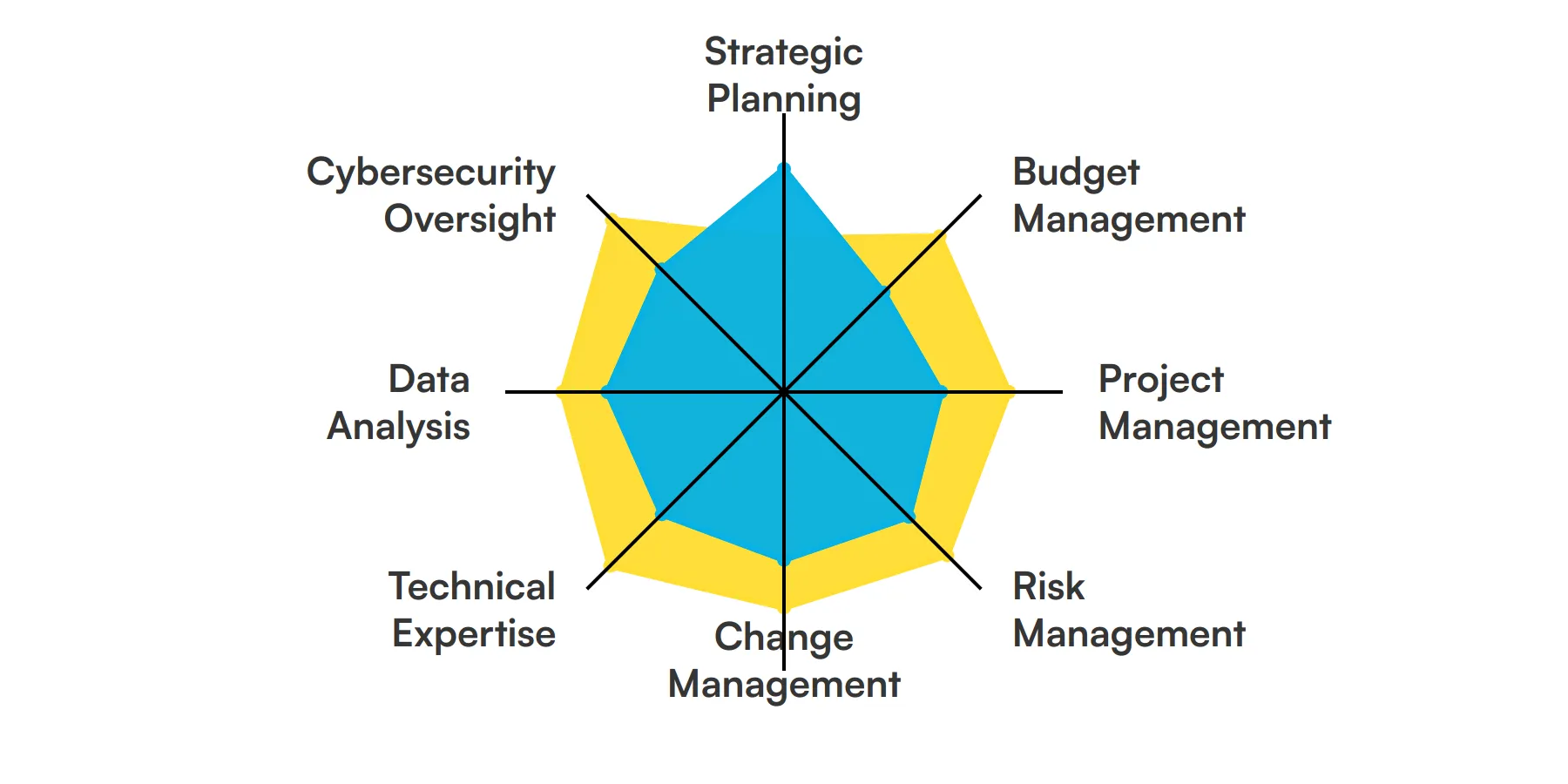
Strategic Planning
An IT Director must excel in strategic planning to align technology-related decisions with the organization's goals. This involves forecasting tech trends, planning upgrades, and ensuring that IT initiatives support broader business objectives.
For more insights, check out our guide to writing a Program Director Job Description.
Budget Management
Effective budget management is crucial for an IT Director to ensure that projects stay within financial constraints without compromising on quality. This skill involves cost-benefit analysis, forecasting, and securing the best value from vendors.
Project Management
Project management is key for an IT Director to oversee projects from inception to completion. This includes setting timelines, coordinating teams, and ensuring deliverables meet the specified requirements and deadlines.
Risk Management
IT Directors must identify, analyze, and mitigate risks associated with IT processes and technology. This skill is vital for protecting organizational data and ensuring continuity of operations.
Change Management
Managing change effectively is necessary for IT Directors as they implement new technologies or improve existing processes. This involves preparing, supporting, and helping individuals to successfully adopt change.
Technical Expertise
An IT Director should have a deep understanding of current technologies and systems. This expertise helps in making informed decisions and guiding the IT team in handling complex technical challenges.
Check out our guide for a comprehensive list of interview questions.
Data Analysis
Data analysis enables an IT Director to make decisions based on quantitative data. This skill is used to assess system performance, improve operations, and drive strategic business decisions.
Cybersecurity Oversight
With increasing cyber threats, an IT Director must oversee the organization's cybersecurity strategies. This includes developing security protocols, managing security operations, and ensuring compliance with regulations.
For more insights, check out our guide to writing a Cyber Security Engineer Job Description.
9 secondary IT Director skills and traits
The best skills for IT Directors include Vendor Management, Team Leadership, Communication Skills, Regulatory Compliance, Innovation Management, Customer Service Orientation, Technical Training, Disaster Recovery Planning and Performance Monitoring.
Let’s dive into the details by examining the 9 secondary skills of a IT Director.
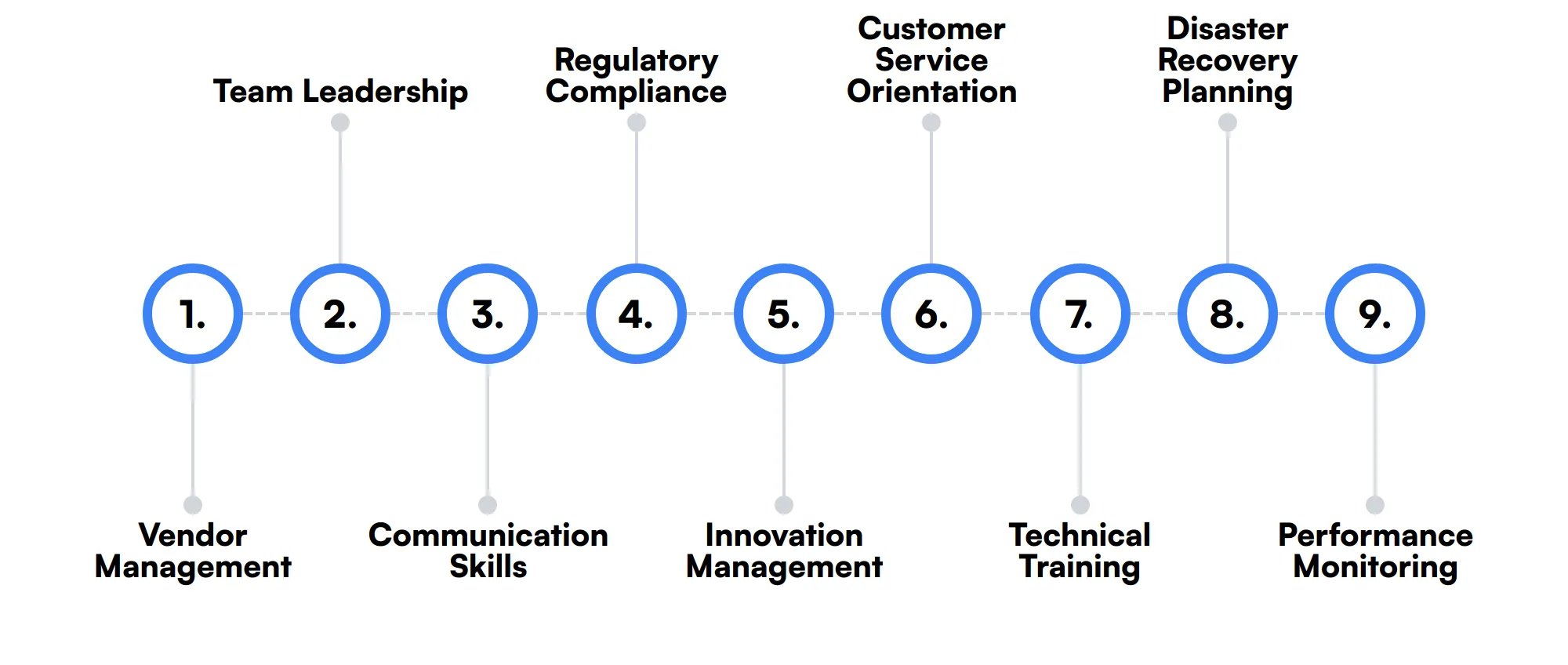
Vendor Management
Negotiating with and managing vendor relationships is important for securing products and services that meet the needs of the organization at the best possible cost.
Team Leadership
While not a primary focus, guiding and motivating IT staff effectively helps in achieving departmental goals and maintaining high morale.
Communication Skills
Clear communication is necessary for articulating technology strategies to non-technical stakeholders and for leading the IT department effectively.
Regulatory Compliance
Understanding and implementing IT practices that comply with relevant laws and regulations is important to avoid legal issues and fines.
Innovation Management
Encouraging and managing innovation within the IT department can lead to improved processes and technologies that provide a competitive edge.
Customer Service Orientation
Ensuring that the IT department delivers excellent service to internal and external customers can enhance satisfaction and support operational success.
Technical Training
Developing and implementing training programs for new technologies and systems is crucial for keeping the IT team up-to-date and effective.
Disaster Recovery Planning
Planning for potential IT disasters and ensuring that there are procedures in place to recover data and maintain IT services is essential for business continuity.
Performance Monitoring
Regularly assessing the performance of IT systems and initiatives helps in identifying areas for improvement and ensuring resource efficiency.
How to assess IT Director skills and traits
Assessing the skills and traits of an IT Director involves more than just glancing at their resume. It's about understanding how they can handle complex challenges like strategic planning, budget management, and cybersecurity oversight. To truly gauge their capabilities, you need a method that goes beyond the conventional interview.
This is where skills assessments come into play. By using targeted assessments, you can measure an IT Director's proficiency in areas critical to their role, such as project management, risk management, and technical expertise. Adaface assessments offer a tailored approach to evaluating these competencies, ensuring that you can identify candidates who are not only skilled but also a good fit for your organization's specific needs. Learn more about Adaface assessments here.
Moreover, these assessments can significantly streamline your hiring process. By focusing on direct evaluations of key skills like data analysis and change management, you can achieve a more accurate understanding of a candidate's potential, leading to a more effective and efficient hiring decision.
Let’s look at how to assess IT Director skills with these 6 talent assessments.
AI Product Manager Test
Our AI Product Manager Test evaluates a candidate's ability to manage AI-driven products, focusing on AI concepts, product strategy, and customer insights.
The test assesses understanding in areas such as AI fundamentals, data modeling, and generative AI applications, alongside essential project and business analysis skills.
Candidates proficient in this test demonstrate strong capabilities in data analysis, communication, and storytelling, crucial for effective AI product management.
Financial Accounting Online Test
Our Financial Accounting Online Test measures expertise in financial statements, accounting principles, and financial reporting.
It evaluates candidates on their knowledge of double-entry bookkeeping, financial ratios, and income and expense recognition, as well as their ability to handle depreciation, amortization, and inventory valuation.
Successful candidates will show a deep understanding of financial analysis and the ability to communicate financial information effectively to stakeholders.
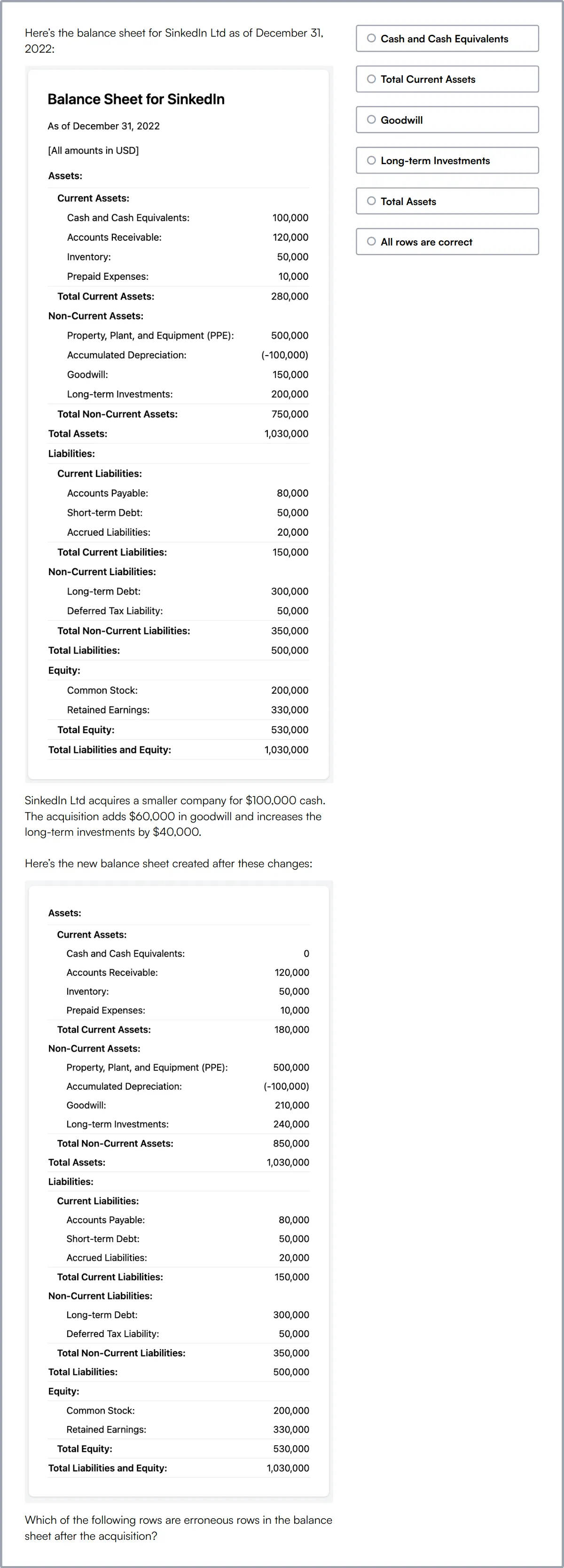
Project Management Test
The Project Management Test assesses a candidate's ability to oversee projects from inception to completion, focusing on planning, risk assessment, and stakeholder management.
This test covers key aspects such as budget estimation, situational judgement, resource management, and understanding of both agile and traditional project management methodologies.
Candidates who excel in this test are adept at prioritizing tasks, managing changes, and creating detailed project reports.
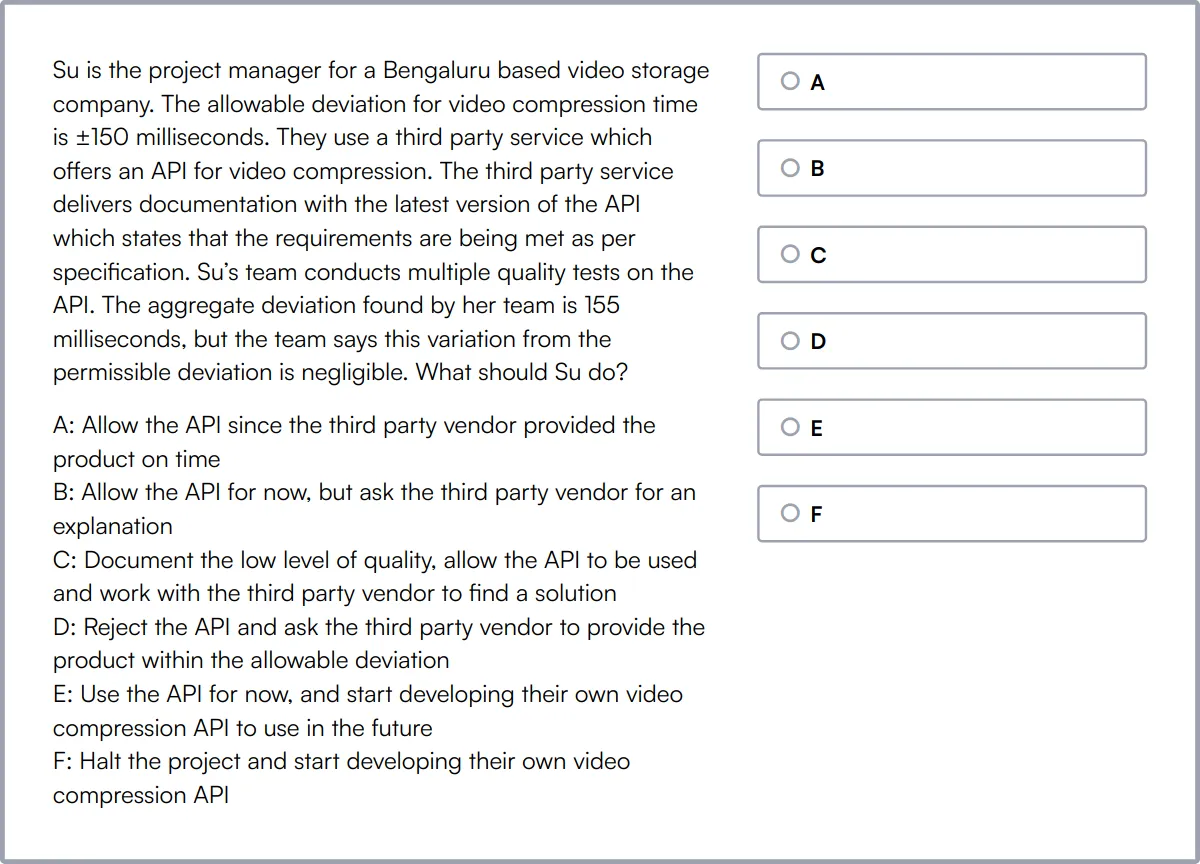
GDPR Online Test
Our GDPR Online Test evaluates a candidate's understanding of GDPR regulations and best practices for data protection and privacy.
The test challenges candidates on their knowledge of data privacy, protection, security, and compliance, including aspects like data breach handling, consent management, and data subject rights.
Proficient candidates will demonstrate the ability to develop and implement effective GDPR compliance policies and ensure the security of personal data.
Scrum Master Test
The Scrum Master Test gauges a candidate's understanding of the Scrum framework and agile principles, essential for managing agile projects.
It assesses knowledge in sprint planning, product backlog management, and the facilitation of Scrum events like daily stand-ups and retrospectives.
Candidates skilled in this area are proficient in handling Scrum roles, artifacts, and user stories, ensuring efficient project execution and team collaboration.
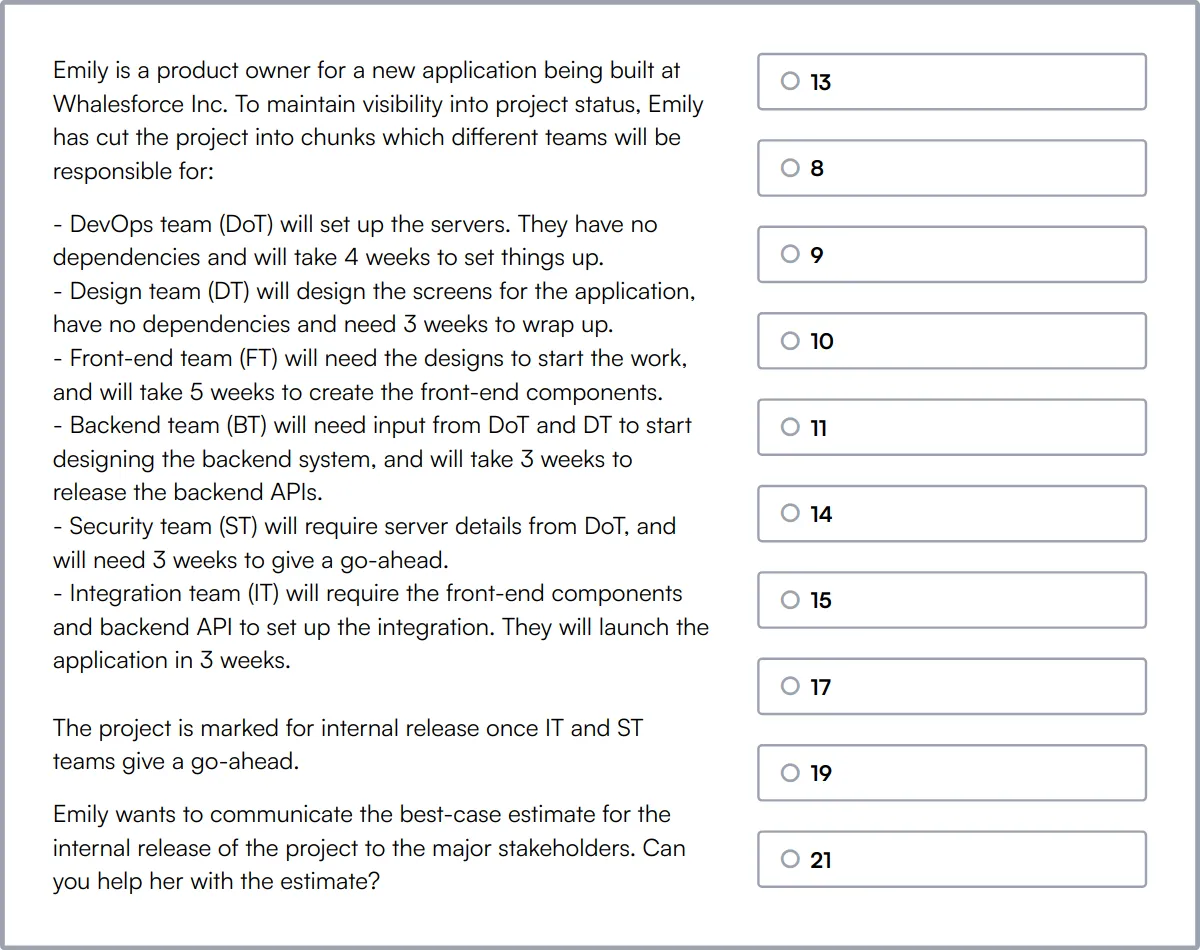
Technical Aptitude Test
Our Technical Aptitude Test evaluates a candidate's general technical knowledge and problem-solving skills across various domains.
The test includes questions on programming fundamentals, data structures, algorithm basics, and other technical aptitudes like networking and security.
High-scoring candidates demonstrate strong analytical skills and the ability to apply logical reasoning to solve complex technical problems.
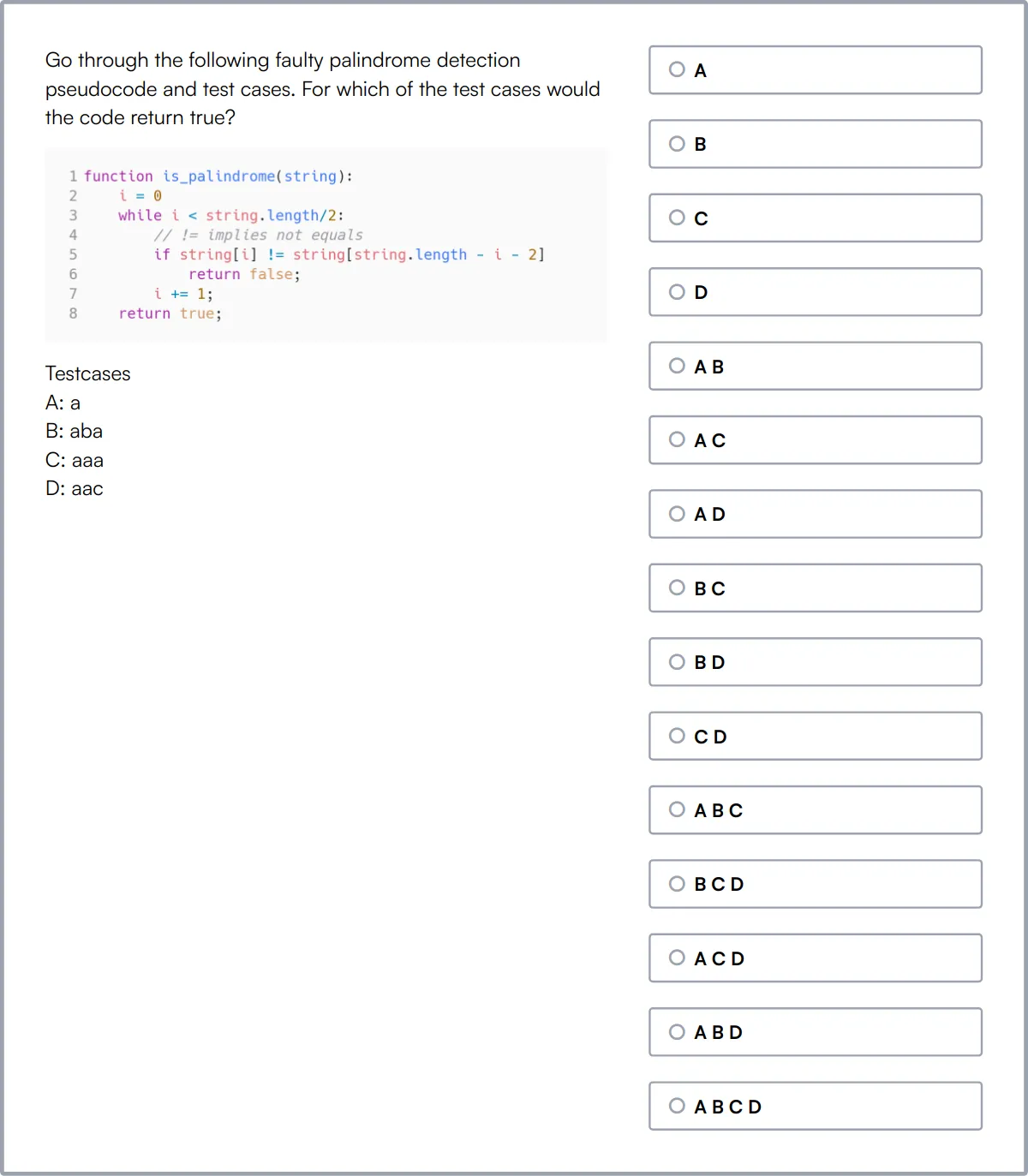
Summary: The 8 key IT Director skills and how to test for them
| IT Director skill | How to assess them |
|---|---|
| 1. Strategic Planning | Evaluate the ability to set long-term goals and align IT initiatives. |
| 2. Budget Management | Assess skills in allocating and managing financial resources effectively. |
| 3. Project Management | Check proficiency in planning, executing, and closing projects. |
| 4. Risk Management | Determine capability to identify, assess, and mitigate IT risks. |
| 5. Change Management | Gauge effectiveness in leading and managing organizational change. |
| 6. Technical Expertise | Evaluate depth of knowledge in relevant IT technologies and systems. |
| 7. Data Analysis | Assess ability to interpret and utilize data for decision-making. |
| 8. Cybersecurity Oversight | Check skills in protecting IT infrastructure from security threats. |
IBM RPG 400 Test
IT Director skills FAQs
What are the key skills required for an IT Director role?
Key skills include Strategic Planning, Budget Management, Project Management, Risk Management, Change Management, Technical Expertise, Data Analysis, Cybersecurity Oversight, Vendor Management, Team Leadership, Communication Skills, Regulatory Compliance, Innovation Management, Customer Service Orientation, Technical Training, Disaster Recovery Planning, and Performance Monitoring.
How can recruiters assess an IT Director's strategic planning skills?
Recruiters can assess strategic planning skills by asking candidates to describe past experiences where they developed and executed long-term IT strategies. Look for examples of aligning IT goals with business objectives.
What questions should be asked to evaluate an IT Director's budget management skills?
Ask candidates to provide examples of how they have managed IT budgets in the past, including any cost-saving measures they implemented. Inquire about their experience with financial forecasting and resource allocation.
How important is technical expertise for an IT Director?
Technical expertise is important for understanding the complexities of IT systems and making informed decisions. However, the level of technical depth required can vary depending on the organization's needs.
What methods can be used to assess an IT Director's risk management capabilities?
Evaluate risk management capabilities by asking candidates to discuss specific instances where they identified and mitigated IT risks. Look for their approach to risk assessment and contingency planning.
How can communication skills be evaluated in an IT Director candidate?
Assess communication skills by observing how candidates articulate their thoughts during the interview. Ask them to explain complex technical concepts to a non-technical audience and evaluate their clarity and effectiveness.
What role does cybersecurity oversight play in an IT Director's responsibilities?
Cybersecurity oversight involves ensuring the organization's IT infrastructure is secure from threats. This includes implementing security policies, monitoring for breaches, and staying updated on the latest security trends.
How can recruiters gauge an IT Director's experience with disaster recovery planning?
Ask candidates to describe their experience with disaster recovery planning, including any real-life scenarios where they had to execute a recovery plan. Look for their understanding of backup systems and continuity strategies.

40 min skill tests.
No trick questions.
Accurate shortlisting.
We make it easy for you to find the best candidates in your pipeline with a 40 min skills test.
Try for freeRelated posts
Free resources



